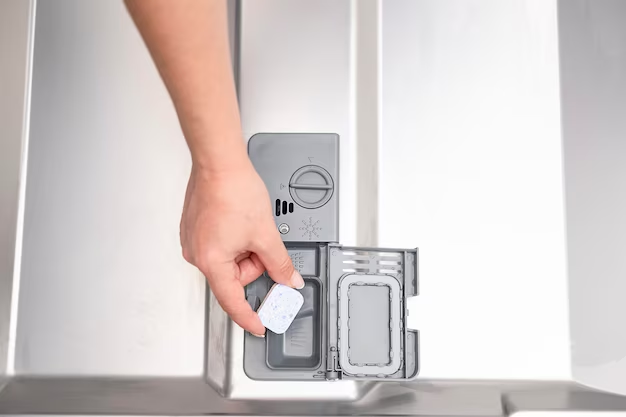Easily Adjusting the Temperature on Your Whirlpool Refrigerator: A Complete Guide
Is your food not as fresh as you'd like? Is the milk a bit too frosty? If you're experiencing these issues, it might be time to adjust the temperature settings of your Whirlpool refrigerator. Setting the right temperature is crucial for maintaining food quality and ensuring energy efficiency. Let’s take a deep dive into how you can effortlessly manage these settings.
🌡️ Understanding Your Whirlpool Refrigerator's Temperature Settings
How Do Refrigerator Temperature Controls Work?
At the core of your refrigerator’s cooling system is a precise temperature control mechanism. Typically, Whirlpool refrigerators come with electronic or dial-type controls. These are strategically designed to regulate the internal temperatures, ensuring an optimal environment for preserving your perishables.
Ideal Temperature Settings
Most models have suggested temperature settings around 37°F (3°C) for the fridge and 0°F (-18°C) for the freezer. These temperatures help in slowing down bacterial growth and keeping your food fresh for longer periods. The aim is to maintain a balance that supports longevity in food quality without turning your milk into an ice block!
Why Temperature Settings Matter
Temperature settings are not just about arbitrarily moving a dial or pressing some buttons. They influence:
- Food Safety: Improper settings can lead to spoilage and foodborne illnesses.
- Energy Consumption: Lower settings unnecessarily escalate electricity bills.
- Appliance Longevity: Constant shifts in temperature settings can strain the appliance.
📚 Step-by-Step Guide to Set Your Whirlpool Refrigerator's Temperature
Whether you’re a new owner or just need a refresher, here’s how you can adjust the temperature effortlessly.
1. Identify Your Refrigerator Model
Begin by noting the model type of your Whirlpool refrigerator. This is usually found on a label inside the appliance or on the user manual. Knowing your model aids you in quickly identifying which control system you need to operate—electronic or dial-based.
2. Locating the Controls
- Electronic Controls: Typically found on the inside of the refrigerator or the front display.
- Dial Controls: These are often on the ceiling or walls of the fridge compartment.
3. Setting the Refrigerator Temperature
Using Electronic Controls:
- Step 1: Press the 'Fridge' button on the display.
- Step 2: Adjust the temperature using the 'Up' or 'Down' arrow keys. Wait a few hours for the settings to stabilize before checking for results.
Using Dial Controls:
- Step 1: Turn the dial towards the lower numbers (colder) or higher numbers (warmer).
- Step 2: Check the temperature after a few hours.
4. Setting the Freezer Temperature
Follow a similar process as the refrigerator, but ensure that the freezer settings optimize ice formation without affecting energy use.
- Electronic Controls: Use the 'Freezer' button, then adjust the temperatures.
- Dial Controls: Turn to the desired level, usually marked with “colder” settings.
🕵️♂️ Troubleshooting Common Temperature Problems
Even with precise settings, problems may arise. Let’s explore a few common issues and their potential remedies:
Problem: Fridge or Freezer Too Warm
Solutions:
- Check Door Seals: Ensure they are airtight and not letting warm air enter.
- Clear Vents: Blocked vents restrict airflow, leading to ineffective cooling.
- Inspect the Thermostat: It might be faulty and need replacement.
Problem: Excessive Frost Build-Up in Freezer
Solutions:
- Defrost the Freezer: Manual defrosting might be necessary if frost layers are too thick.
- Ensure Door Seals: Poor sealing facilitates frost accumulation.
Problem: Fluctuating Temperatures
Solutions:
- Control Board Issues: Verify if there is an electrical malfunction causing erratic behavior.
- Frequent Opening: Reduce door openings as it prompts temperature fluctuations.
🛠️ Maintenance Tips for Optimal Performance
To keep your Whirlpool refrigerator in great shape, consider adopting these practices:
- Regularly Clean Coils: Dirty coils force the refrigerator to work harder, so vacuum them periodically.
- Check Temperature Settings Routinely: Devices controlling temperatures can be jostled out of place.
- Organize Your Fridge: Blocked air passages can interfere with cooling efficiency.
📝 Quick Reference Guide
Here’s a handy summary of tips and tricks for setting your Whirlpool refrigerator's temperature effectively:
| Task | Control Type | Action |
|---|---|---|
| Identify Model | Any | Locate on label or manual |
| Setting Fridge Temperature | Electronic | Use 'Fridge' button and adjust arrows |
| Setting Fridge Temperature | Dial | Turn dial; lower for colder, higher for warmer |
| Setting Freezer Temperature | Electronic | Use 'Freezer' button and follow same steps |
| Setting Freezer Temperature | Dial | Similar method as fridge dial |
| Troubleshoot Warm Fridge/Freezer | Any | Check seals, vents, and thermostat |
| Prevent Frost Build-Up | Any | Ensure proper door closure |
| Fight Fluctuations | Any | Check control board and minimize door openings |
Key Actions to Remember:
- ✅ Clean: Keep your appliance tidy for efficiency.
- 🔍 Monitor: Regular checks can prevent unforeseen issues.
- 📅 Schedule: Routine maintenance extends appliance life.
🌟 Conclusion and Final Thoughts
Discovering the ideal temperature for your Whirlpool refrigerator ensures optimal food preservation and energy efficiency. By becoming familiar with your appliance’s unique settings and undertaking regular maintenance, you place yourself in the best position to enjoy fresh, safe, and long-lasting food.
By maintaining your Whirlpool refrigerator appropriately and making informed adjustments, you not only enhance your food's longevity but also contribute to the appliance's efficiency and lifespan. Remember these guidelines as you embark on this simple yet essential home management task.

